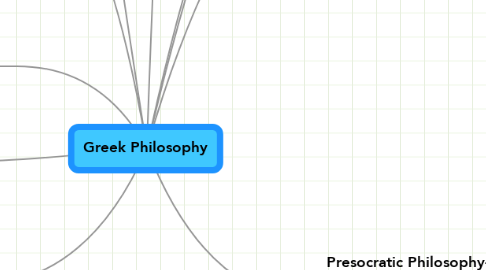
1. Plato
1.1. 428-348B.C.E.
1.2. Ethics and politics
1.3. The Academy
1.4. Quotes
1.4.1. "A good decision is based on knowledge and not on numbers."
2. Philosophy
2.1. Comes from Greek word Philo-loving and sophia-wisdom.
2.2. a process of rigorous inquiry, and structured argumentation through which human assumptions, opinions, and beliefs can be revealed and examined.
2.3. Three types of Philosophy
2.3.1. Metaphysics-Existence, being, and reality
2.3.2. Epistemology-Knowledge
2.3.3. Ethics-Living well and flourishing as a human
3. Early Philosophy
3.1. Same as Presocratic Philosophy
3.1.1. Thales
3.1.2. Anaximander
3.1.3. Anaximenes
3.1.4. Heraclitus
3.1.5. Democritus
3.1.6. Empedocles
3.1.7. Zeno
3.1.8. Parmenides
3.2. Cosmology
3.2.1. Study of nature
4. Bibliography
4.1. <script src="http://writer.zoho.com/public/hyoung1/Greek-philosophy-biblio1/script" ></script>
5. Hellenistic Philosophy
5.1. Epicureans
5.1.1. sought to live in accordance with this understanding of the universe by seeking moderate pleasure in life.
5.1.2. Epicurus 341-270 B.C.E.
5.2. Stoics
5.2.1. Zeno 336-265 B.C.E
5.2.2. Zeno
5.2.3. Cicero 106-43 B.C.E
5.3. Skeptics
5.3.1. Pyrrho- 360-270 B.C.E
5.4. Cynics
5.4.1. Diogenes of Sinope- 400-325 B.C.E
6. Aristotle
6.1. 384-322 B.C.E
6.2. Plato's Pupil
6.2.1. "While both are dear, piety requires us to honor truth above our friends"
6.3. Lyceum
6.4. The complete works of Aristotle
6.5. the Nicomachean Ethics
6.6. Quote
6.6.1. "A friend is a second self."
6.7. Father of botany, zoology, physics, linguistics, and logic.
6.8. Both scientist and philosopher
7. Socrates
7.1. 469-399 B.C.E.
7.2. conversation and cross examination
7.3. "How should one live"
7.4. attacked sophist
7.5. Socratic Method
7.6. Athenian hoplite
7.7. Teacher of Plato
7.8. Quote
7.8.1. "As for me, all I know is that I know nothing."
8. Athenian Philosophy
8.1. Athens; center of Greek Philosophy
8.2. Shift from cosmology to human affairs
9. Sophists-"wise guys", "learned experts"
9.1. Believed that knowledge is situational or relative.
9.2. used rhetorical argumentation to point out contradictions in traditional values and knowledge.
9.3. Sophist Philosophers
9.3.1. Protagoras 490-420 B.C.E
9.3.1.1. Quotes
9.3.1.1.1. As to gods, I have no way of knowing either that they exist or do not exist, or what they are like. Protagoras
9.3.1.1.2. Man is the measure of all things.
9.3.1.1.3. The Athenians are right to accept advice from anyone, since it is incumbent on everyone to share in that sort of excellence, or else there can be no city at all.
9.3.1.2. First Sophist
9.3.1.2.1. Taught grammar, rhetorical, and interpretations of poetry.
9.3.1.3. Believed that....
9.3.1.3.1. 1. That man is the measure of all things.
9.3.1.3.2. 2. That he could make the worse argument seem stronger
9.3.1.3.3. 3. That one could not tell if the gods exist or not.
9.3.2. Gorgias 483-376 B.C.E
9.3.2.1. Sicilian Philosopher, orator, and rhetorician
9.3.2.2. Quote
9.3.2.2.1. In arguing one should meet serious pleading with humor, and humor with serious pleading.
9.3.3. Isocrates 436-338 B.C.E.
9.3.3.1. Isocrates Philosophy
9.3.3.1.1. Quote
10. Presocratic Philosophy-Before Socrates
10.1. Two fundamental assumptions
10.1.1. If we wish to understand things thoroughly we must understand its origins.
10.1.2. a reasoned explanation of causes of things is both possible and profitable.
10.2. Presocratic Philosophers
10.2.1. Early Pre-Socratic philosophers sought to identify a primarily material substance of the world.
10.2.2. Thales
10.2.2.1. 620-527 B.C.
10.2.2.2. Father of Philosophy
10.2.2.3. Had no written records
10.2.2.4. Believed that all things were made of the same basic element, water.
10.2.2.5. More mathematician than Philosopher
10.2.2.5.1. Remembered for his famous theorem
10.2.3. Anaximander
10.2.3.1. 610-546 B.C.
10.2.3.2. Thought the universe came from one substance
10.2.3.3. Came from Miletus
10.2.3.4. Questioned mythes, the heaven and the gods
10.2.3.5. First meteorologist
10.2.3.6. founded the science of geography and astronomy
10.2.3.7. apeiron
10.2.4. Anaximenes
10.2.4.1. 585-525 B.C
10.2.5. Heraclitus
10.2.5.1. 535-475 B.c.
10.2.5.2. embraced change as constant movement between opposites within an ordered pair reasonable cosmological system.
10.2.5.3. Quote
10.2.5.3.1. "it is not possible to step twice in the same river."
10.2.6. Democritus
10.2.6.1. 460-370 B.C.E.
10.2.7. Empedocles
10.2.7.1. 484 B.C.E.-424 B.C.E.
10.2.7.2. universe made from four elements
10.2.8. Parmenides
10.2.8.1. 585 B.C.E.
10.2.9. Pre-Socratic philosophy and Geometry
10.2.9.1. Pythagoras 571-497
10.2.9.1.1. Pythagoreans
10.2.9.2. 1. Is the world governed by abstract mathematical principles or not
10.2.9.3. 2. How can we use this knowledge to do something practical.
10.2.9.4. The universal formula
